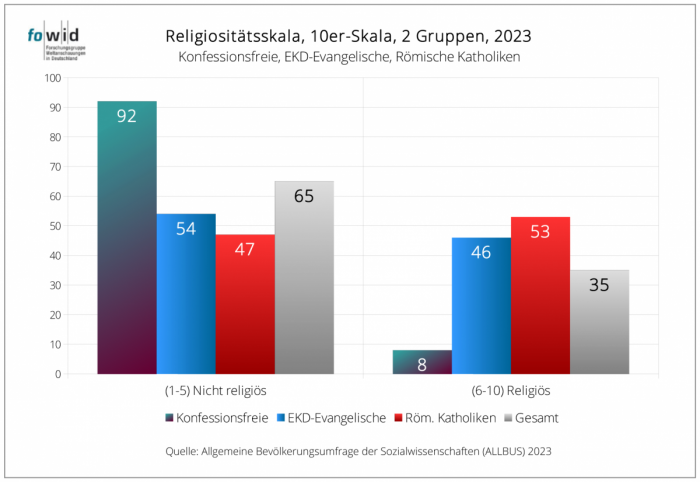fowid Analysis: The Non-Denominational in Germany
What characterizes people who do not belong to any religion?

grafik-33-3-r-skala-zwei_gruppen.png
Bar chart of self-reported religiosity by denomination (non-denominational, catholic, protestant, total), on a 1-10 scale split into lower (1-5) and higher (6-10) ratings. Source: fowid.com
The non-denominational in Germany – that is around 37 million people, of whom 30 million are older than 18 years. What is characteristic of them? And what distinguishes them from church members? The "Research Group on Worldviews in Germany" (fowid) wants to clarify these questions as part of a three-part study that draws on the current data of the "German General Social Survey" (ALLBUS, 1982 – 2023).
fowid Director Carsten Frerk has today published the first part of his analysis, which already conveys some remarkable findings. For example, it is shown that the non-denominational and church members differ only very little from one another in their personal, social, and political preferences. One of the main reasons for this is likely that church members have meanwhile become much more secular, which is expressed, among other things, in the fact that 54 percent of Protestants and 47 percent of Catholics classify themselves as "not religious". Significant differences can be identified especially on those topics that concern the individual right to self-determination, such as assisted suicide and abortion. Catholics in particular express themselves much more restrictively on these points than the non-denominational.
Overall, a greater homogeneity in worldviews can be identified among the non-denominational than among church members. Thus, 92 percent of the non-denominational see themselves as "non-religious", while church members are divided on this question (see above). Also, 84 percent of the non-denominational advocate for a "naturalistic worldview" in which there are no metaphysical figures (gods, devils, angels, demons, or saints) that intervene in the laws of nature. The fact that this naturalistic attitude is now also shared by 76 percent of Protestants and 77 percent of Catholics shows how fragile the Christian worldview has become in Germany.
Carsten Frerk summarizes: "For the non-denominational, there are no indications that they could (again) become church members in larger numbers. The situation is different for church members. Around 30 to 40 percent of EKD Protestants or 20 to 30 percent of Roman Catholics can be classified as "secular": They live self-determined lives without reference to the afterlife, without God and authorities, with reservations about church/religion – and are nevertheless church members. This makes them (especially the younger ones among them) potential future non-denominational people, if the reasons for their current church membership change."
The first part of the study on the non-denominational, which contains numerous graphics and tables on different thematic fields, can be found from now on the fowid website.
